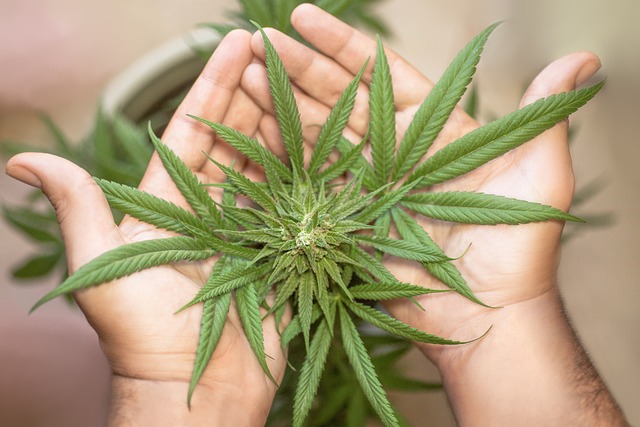Δ9-tetrahydrocannabinolic acid (THCA), a non-psychoactive cannabinoid present in cannabis, is gaining attention for its potential to manage various types of pain, including neuropathic and inflammatory conditions. THCA infused products, available as flowers, edibles, and topicals, offer a natural alternative to conventional pharmaceuticals, providing analgesic benefits without the psychoactive effects associated with THC. These products engage with the endocannabinoid system by interacting with CB1 and CB2 receptors, influencing pain sensation, inflammation, and immune response. The anti-inflammatory and analgesic properties of THCA are attributed to its ability to inhibit neurotransmitters that convey pain signals and reduce the production of cytokines and prostaglandins, which contribute to inflammation and pain. It's crucial to source high-quality THCA infused products from reputable brands with third-party lab test results for safety and efficacy. Consumption methods range from inhaling finely ground flowers or vaporizing at controlled temperatures to ingesting edibles or capsules, each offering a unique approach to pain relief. Users should start with low doses, especially when consuming edibles, to gauge the effects before adjusting their intake. THCA infused products for pain relief are subjects of ongoing research, which continues to support their therapeutic use, highlighting the importance of understanding their mechanisms and proper usage for optimal pain management outcomes.
Exploring the therapeutic properties of cannabinoids has led to a growing interest in THCA infused products, particularly for those seeking natural alternatives for pain relief. This article delves into the potential of THCA flower, a non-psychoactive cannabinoid found in raw cannabis that is gaining attention for its analgesic qualities. We will dissect the science behind THCA’s effects, guide you through sourcing and consuming it effectively, and explore its role within the entourage effect. From understanding how it compares to other cannabinoids to personalizing your experience for maximum benefit, this comprehensive overview will illuminate the multifaceted benefits of THCA infused products for pain relief, all within the legal landscape that governs their accessibility. Join us on this in-depth journey into the healing potential of THCA.
- Unlocking the Potential of THCA Flower for Pain Relief
- Understanding THCA: The Cannabinoid Before Cannabis Heating
- The Science Behind THCA's Analgesic Effects
- Sourcing High-Quality THCA Infused Products
- How to Consume THCA Flower for Optimal Pain Relief
Unlocking the Potential of THCA Flower for Pain Relief

THCA, or Tetrahydrocannabinolic Acid, is a non-psychoactive cannabinoid found in the raw cannabis plant that holds promise for pain relief. When exposed to heat, THCA converts to THC, the primary psychoactive component of cannabis. However, research suggests that THCA itself may offer therapeutic benefits without the psychotropic effects. Studies have indicated that THCA interacts with the body’s endocannabinoid system, potentially providing relief from various types of pain by modulating neurotransmitter release and immune system responses. As a result, THCA-infused products for pain relief are gaining traction in both the medical and recreational cannabis markets. These products, which can range from flowers to edibles, offer an alternative for individuals seeking natural alternatives to over-the-counter or prescription pain medications. The anti-inflammatory and analgesic properties of THCA make it a compelling option for those suffering from chronic pain, neuropathy, and other painful conditions, with fewer side effects compared to traditional pharmaceuticals. As interest in cannabis-based therapies grows, the development of products harnessing the potential of THCA continues to be an area of significant research and innovation in the quest for effective, natural pain relief solutions.
Understanding THCA: The Cannabinoid Before Cannabis Heating

betaine, a non-psychoactive cannabinoid found naturally in raw cannabis plants, has garnered attention for its potential therapeutic properties. THCA, or tetrahydrocannabinolic acid, is the precursor to THC (tetrahydrocannabinol), the psychoactive compound commonly associated with cannabis. When heat is applied through processes like decarboxylation, THCA converts into THC, altering its effects. THCA infused products are gaining traction in the realm of pain relief due to their ability to interact with the body’s endocannabinoid system. These products offer a unique advantage as they can provide relief without the psychoactive ‘high’ typically associated with cannabis consumption. Research suggests that THCA may be particularly effective for neuropathic and inflammatory pain, potentially offering a viable alternative to traditional pain medications. Its anti-inflammatory and analgesic effects are believed to stem from its interaction with the CB1 and CB2 receptors in the endocannabinoid system, making it a promising option for those seeking natural pain relief options. As the understanding of THCA continues to evolve, its role in various therapeutic applications is becoming increasingly clear, offering hope for those looking to alleviate pain through cannabinoid-based treatments.
The Science Behind THCA's Analgesic Effects

Delta-9-tetrahydrocannabinolic acid (THCA) is the raw, non-psychoactive precursor to the well-known delta-9-tetrahydrocannabinol (THC). Found abundantly in cannabis plants, THCA has garnered attention for its potential analgesic effects. The science behind these pain-relieving properties lies within THCA’s interaction with the body’s endocannabinoid system (ECS), a complex cell-signaling system that helps maintain physiological and psychological homeostasis. Research indicates that THCA interacts with cannabinoid receptors, particularly CB1 and CB2 receptors, which are spread throughout the body. By activating these receptors, THCA can influence pain sensation, inflammation, and the body’s immune response. This interaction is believed to be responsible for its analgesic effects, making THCA infused products a viable option for those seeking natural pain relief without the psychoactive effects associated with THC.
Furthermore, studies have shown that THCA may exert its analgesic effects through multiple mechanisms of action. It is thought to inhibit the formation of neurotransmitters that signal pain to the brain, thereby reducing the perception of discomfort. Additionally, THCA has been observed to possess anti-inflammatory properties, which can further contribute to its pain-relieving capabilities. The anti-inflammatory action of THCA is believed to stem from its ability to inhibit key inflammatory molecules, such as cytokines and prostaglandins, which play a role in the body’s immune response and the process of inflammation. As such, THCA infused products for pain relief are being increasingly recognized for their potential to offer effective analgesia without the psychoactive ‘high’ that comes with THC-containing products.
Sourcing High-Quality THCA Infused Products

When exploring options for THCA infused products aimed at pain relief, the quality of the sourcing cannot be overstated. High-quality THCA, or Tetrahydrocannabinolic Acid, is the raw cannabinoid precursor to THC (Tetrahydrocannabinol) and has garnered attention for its potential therapeutic benefits without the psychoactive effects associated with THC. Sourcing these products from reputable producers is paramount, as it ensures that the THCA has been extracted and refined under strict standards, maintaining its purity and potency. Trustworthy brands often employ supercritical CO2 extraction methods to obtain THCA in a clean, solvent-free environment, which is crucial for preserving the cannabinoid’s integrity. Consumers seeking THCA infused products for pain relief should look for certifications of analysis that verify the product’s safety and efficacy. Additionally, these products are often available in various forms such as tinctures, capsules, and topicals, each offering a different method of administration and absorption into the body. By choosing high-quality THCA infused products from reliable sources, individuals can harness the potential benefits for pain management while ensuring a safe and responsible approach to their wellness regimen.
How to Consume THCA Flower for Optimal Pain Relief

THCA, or tetrahydrocannabinolic acid, is a non-psychoactive cannabinoid found in the Cannabis sativa plant that has been gaining attention for its therapeutic potential. For individuals seeking pain relief, THCA infused products offer a promising alternative to traditional pharmaceuticals. Consuming THCA flower for optimal pain relief involves understanding the right methods and dosages. When inhaling THCA through smoke or vapor, it’s crucial to grind the flower to a fine consistency for even combustion or vaporization. This ensures that the active compounds are effectively released and that you can control the amount you ingest, which is key for pain management. Vaporizing THCA flower provides a more controlled temperature setting compared to smoking, potentially reducing the risk of respiratory irritation while still offering the desired analgesic effects.
Another consumption method for THCA is through edibles or capsules, where THCA is activated into THC by decarboxylation during the preparation process. Edibles can offer a longer duration of pain relief as the cannabinoids are absorbed through the digestive system and metabolized over time. It’s important to start with a low dose when consuming edibles and to wait for the full effect before determining if you need more. Consuming THCA infused products, whether inhaled or ingested, should be done with consideration of your unique body chemistry and pain symptoms. Consulting with a healthcare professional familiar with cannabis can help tailor your consumption method to your specific needs for the best possible pain relief experience.
THCA infused products have emerged as a promising option for individuals seeking natural pain relief, with scientific research underscoring their potential benefits. This article has delved into the multifaceted aspects of THCA flower, from its role in pain management to the nuances of its cultivation and consumption. For those interested in exploring THCA’s analgesic properties, it is clear that careful consideration of product sourcing is paramount. High-quality THCA infused products, when properly consumed, can offer significant relief for various types of pain. As the understanding of cannabinoids continues to evolve, the therapeutic use of THCA remains a subject of growing interest and application. With continued research and refined product availability, THCA infused products are poised to become an integral part of pain management strategies.
